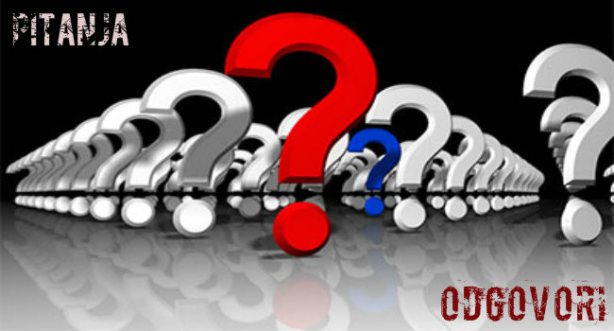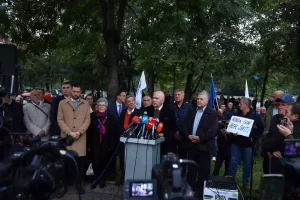Dr. Marko Attila Hoare: How can the Bosnian question be resolved ?

When we talk about solutions for Bosnia-Hercegovina, the emphasis is usually on what we would like Bosnia-Hercegovina to look like. This is very easy to say. I and many others would like Bosnia-Hercegovina to be a sovereign, unitary state of all its citizens, regardless of nationality. However, it is much more difficult to see how to achieve this. In this presentation, I am going to talk about a much more modest goal: the development of a Bosnian resistance strategy to prevent a greater misfortunate from befalling Bosnia-Hercegovina. And that will take the first steps toward restoring the state. I won’t engage in false optimism; this will be an analysis of the reality of the situation with a hard-headed analysis of what can realistically be achieved.
Bosnia-Hercegovina’s problems do not need explaining – we are all familiar with them. Bosnia-Hercegovina as a state exists only formally; on paper; in reality, Bosnia-Hercegovina has no functioning state. Bosnia-Hercegovina is divided into two entities. Of these, the Serb entity is the more homogenous one. It is the principal obstruction to Bosnia-Hercegovina’s functioning as a state. The Federation – some once expected – might have acted as the core around which Bosnia-Hercegovina could be reintegrated. So people have viewed the RS as the ‘bad’ entity and the Federation as the ‘good entity’. In fact, they are both bad entities, and the Federation is as much part of the problem as the RS. The Federation is crushed under the weight of its bureaucracy. Its division into cantons weakens both the administration and the economy. The Federation is plagued by the conflicts between Bosniak and Croat politicians. But reform of the system is impossible. It’s impossible to reform the state, because this would require consensus between the three nationalities. But the RS politicians will always veto any reforms that would make the state function. Reform of the Federation is also difficult. The Croats already feel marginalised within the Federation and view the system of cantons as a guarantee for at least a degree of autonomy.
The status quo is unsustainable
At one level, the status quo represents an acceptable compromise, or lesser evil. Bosniaks, and those Serbs and Croats who believe in a united Bosnia-Hercegovina, get at least the illusion of a united Bosnia-Hercegovina. They don’t get a real state, but they get a unified country that exists at least on paper. In return, those Serbs who don’t identify with Bosnia-Hercegovina get an entity with most of the attributes of statehood, but without the full right to secede. Those Croats who don’t identify with Bosnia-Hercegovina are perhaps the least satisfied, but they aren’t strong enough unilaterally to change the system. The status quo, some might feel, is better than any alternatives. However, there is reason to believe that it is unsustainable.
An entity such as the RS has a natural tendency to seek ever greater independence, and eventually full secession. That would be true even if Bosnia-Hercegovina were a relatively rich and successful country like Belgium, Spain or the UK, where there are strong tendencies toward separation in Flanders, Catalonia and Scotland. But the Serb political classes in the RS don’t just want greater autonomy. They wish to negate Bosnia-Hercegovina. Among the ordinary Serb people, the war has created a high level of bitterness that militates against acceptance of Bosnia-Hercegovina. International circumstances can give them hope that they will eventually be able to establish an independent Republika Srpska. Russia is acting as a Great Power in opposition to the European Union and NATO. The Russians have shown in Georgia and in Ukraine that they are fully prepared to dismember other European states, through support for secessionist regions, in opposition to Western wishes.
In the RS, Dodik has established himself as Russia’s ally through supporting Putin’s annexation of Crimea. If and when Dodik leaves office, the next president of Republika Srpska may pursue the same policy. It is entirely possible to envisage a scenario whereby the RS eventually secedes from Bosnia-Hercegovina, with support from Russia and Serbia. Right now, Serbia must behave itself in order to gain entry into the EU. But when Serbia joins the EU eventually, it will no longer need to behave well. The EU has shown that it won’t restrain a member that behaves badly toward a non-member. We have the example of how Greece and Bulgaria treat Macedonia. Or the example of five EU member states that won’t recognise Kosovo – three of them are recent members. Croatia joined the EU, and immediately the Croatian right-wing launched chauvinistic campaigns against gay marriage and the Cyrillic alphabet.
The likelihood is that Serbia will join the EU before Bosnia. So there will be a situation where the two states that tried to partition Bosnia-Hercegovina in the 1990s – Serbia and Croatia – will be in the EU and Bosnia will be outside. Should Serbia and Croatia then try again to partition Bosnia, it is difficult to see how the outside world will stop them. Even if Bosnia-Hercegovina joins the EU alongside Serbia, this will not necessarily help defend the country. Cyprus is in the EU, but the EU is not doing anything to try to end the partition of Cyprus, because Turkey is too strong. And Turkey does not even have the advantage of EU membership. If Bosnia-Hercegovina, Serbia and Croatia are all inside the EU and the RS secedes, the EU will find it very difficult to enforce sanctions against the RS. So Bosnians should be prepared for a possible new assault on Bosnian territorial integrity, involving the secession of the RS – particularly if and when Serbia joins the EU. So it is not necessarily a choice between the status quo and something worse. It may be a choice between an independent RS in its existing borders and something else.
Change won’t come from outside
In seeking to prevent this happening, and looking for a solution, there are two places we can look: from within the country of Bosnia-Hercegovina, and from the international community. Of course, we cannot ignore the outside world. International opinion is always crucially important. The Serb failure to achieve their full goals in the war of the 1990s, and the NATO bombardment of 1995, occurred in part because the Serbs lost the propaganda war – particularly following the Srebrenica massacre. So any attempt at change in Bosnia-Hercegovina has to be made with international public opinion in mind. But change will not come from outside. The wars of the 1990s demonstrated the unwillingness of the Western alliance to defend Bosnia-Hercegovina. Since then, the Western alliance has shown that it will not act to defend the territorial integrity of Georgia or Ukraine from Russian aggression. The excuse has been that these countries are not NATO members, so there is no legal obligation. Bosnia-Hercegovina is also not a NATO member.
So we cannot rely on the West to defend Bosnia-Hercegovina from the RS’s secession, backed by Russia, Serbia and maybe Croatia. Particularly if Serbia is already in the EU. There is no point expecting the international community to bring about a ‘Dayton 2’, and to re-establish a functioning Bosnian state. I recently visited Washington DC, where I met with State Department officials, and they made it clear that the US has no interest in any kind of Dayton 2. They also made it clear that they would only accept change on the basis of consensus. But positive change cannot be on the basis of consensus because of the Serb veto.
The high point of international intervention in Bosnia-Hercegovina, via the Office of the High Representative was in the years of Paddy Ashdown, up to 2006, when significant steps were taken to reintegrate Bosnia-Hercegovina. But since then, the momentum was lost, and the international community effectively stopped rebuilding Bosnia. So the process went into reverse, as Milorad Dodik dismantled the country again. Today the international community is happy provided Bosnia-Hercegovina remains quiet and is not a source of regional instability. This is a small-minded era in European politics. Public opinion in many European countries is increasingly hostile to the European Union. Anti-immigrant racism is very strong, and so is Islamophobia. Resistance to active foreign policy was revealed when the Western states refused to intervene to protect the people of Syria. So this is not a good era to expect constructive Western action to rebuild Bosnia. Only in the event of a major new crisis breaking out over Bosnia would the West feel moved to intervene – as was the case in 1992-95.
Change from within
So change in Bosnia-Hercegovina can only be expected to come from within. The question is how to build a movement for change that embraces Bosnians of all nationalities – Bosniaks, Serbs, Croats and others. Of the three principal Bosnian nationalities, only Bosniaks are overwhelmingly committed to Bosnia-Hercegovina as their homeland. Only a small minority of Serbs, and a slightly larger minority of Croats, identify with Bosnia-Hercegovina as their homeland. This was not always the case. Historically, Serbs and Croats identified with Bosnia-Hercegovina as their homeland in much greater measure than they do today. Before the 1990s, a political mobilisation based on shared Bosnian patriotism, embracing Bosniaks, Serbs, Croats and others, was still a possibility.
Serbs could go either way: toward Bosnian patriotism or toward Great Serbianism – or to a combination of them. But the effects of the war, and in particular the creation of a Bosnian Serb entity, have destroyed Serb identification with the common Bosnian homeland.
In effect – regardless of the extent of the brutality and genocide involved – there now exists a Bosnian Serb nation-state: Republika Srpska. Most Serb inhabitants of the RS identify with it and will not accept the loss of its autonomy. Of course, it’s possible to engage in bridge-building between people in the Federation and those in the RS, and that is positive. But this is not very different from what you would do with citizens of a foreign country, like Serbia or Croatia. Politicians, intellectuals and public figures from the Federation can establish links and projects with those from the RS, as they can with those from Serbia and Croatia. But good relations are not the same as national unification.
As regards the Croats, things are less bad because there is no Croat entity. My feeling is that if the RS could somehow be reintegrated with Bosnia-Hercegovina, Croats could accept the common homeland. But coexistence in the Federation as the smaller partner with the Bosniaks cannot have solid acceptance among the Bosnian Croats. As I said before, the Federation is not the solution; it is part of the problem. The dilemma is, that a reform that might lead to greater Croat acceptance of the Bosnian state – i.e. a third entity – would accelerate the division of the country. A Croat entity would pursue the same separatist policy as the Serb entity. With a Serb and a Croat entity, Bosnia-Hercegovina probably would not last long as a unified state. But the two-entity system alienates the Croats from Bosnia-Hercegovina.
What is to be done ?
It is not for me, as a foreigner, to lay down a precise resistance strategy for Bosnia-Hercegovina, so I’ll just say a few words for further consideration. When I talk here of Bosnians, I mean those citizens of Bosnia-Hercegovina who view the country as their homeland. Mostly Bosniaks, but also Serbs, Croats and others who identify with Bosnia-Hercegovina. Bosnians cannot rely on the international community to defend Bosnia-Hercegovina. So they must be prepared to defend it themselves. That means that if and when the RS does secede, Bosnians must be prepared – if necessary – to respond militarily. If nothing else, the readiness and ability to fight a war to defend Bosnian territorial integrity may act as a deterrence to any attempt at secession. It may also strengthen the hand of those in the international community who support a unified Bosnia-Hercegovina, against those who are prepared to let it break up. For this, it is important to have at least some elements of statehood capable of mobilising national resistance.
It can be valuable to learn from the experience of the 1990s. At the start of the war in 1992, there were two bases for resistance: there were the official organs of the republic, including the Territorial Defence and the MUP/police. But these were difficult to mobilise for defence, since they were partly controlled by Serb and Croat nationalists – agents of Belgrade and Zagreb. Drago Vukosavljevic, commander of the Territorial Defence, was a supporter of the SDS. Jerko Doko, Minister of Defence, was a politician of the HDZ. So Bosnia-Hercegovina’s official organs of defence were paralysed. On the other hand, there was also the Patriotic League. But this was essentially a Bosniak militia, and was not able to mobilise Serbs and Croats to defend a united Bosnia. This dilemma – between a Bosnian and a Bosniak resistance orientation still remains. The resistance should always be in the name of all Bosnian citizens, but realistically it will be Bosniak-majority.
The second dilemma is: how do you prepare to resist without accelerating Serb and Croat secession ? Reforming the Federation is a way of beginning the process of reform in a way that cannot be blocked by the Serb veto. But how do you reform the Federation in a manner that’s acceptable to the Croats, but without empowering Croat separatism ? If we abolish all the cantons, then that is unacceptable for many Croats. But if we reduce the number of cantons to two, then there is a danger that the cantons become entities, and we end up with a Croat entity that pursues the same separatist policy as the Serb entity. I think it is necessary to reduce the number of cantons – maybe to five. In any case, there should remain a central canton in the Federation based on Mostar, that would be ethnically mixed.
But a larger canton including, at least, Sarajevo, Tuzla, Zenica, Travnik and other towns, could act as the heart of a functioning Bosnia-Hercegovina, as the centre of national energy. Here, solid, functioning Bosnian national institutions could be build. Such a large central canton could prepare and mobilise an effective national resistance in the event of a new conflict arising from any attempt at secession. Bosnian citizens need to be psychologically prepared to fight, if necessary, to defend Bosnian unity. Such psychological preparation was lacking in 1992. With a more efficient administration, with a lighter bureaucracy and without any national key, such a large central canton could act as a more attractive magnet for the Bosnian periphery.
This could also mark the start of a more general process of change. It’s important to begin the process of constitutional change; to get the ball rolling. At the very least, such a strengthening of the heart of Bosnia-Hercegovina could put the Bosnians in a stronger position to react to any new state crisis. And this could serve as a deterrent to any attempt to break up the country altogether. And when the international community would see that Bosnians are ready to act independently and to resist, they will be less likely to appease those who seek to divide Bosnia-Hercegovina.





